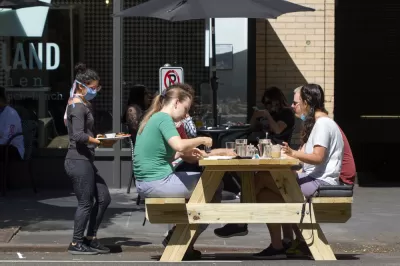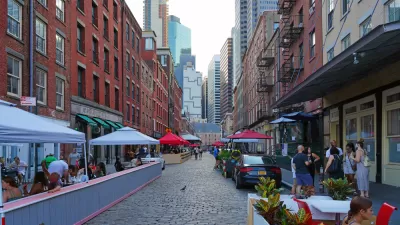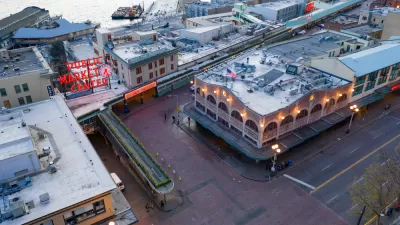It took a pandemic, but the worldwide effort to move restaurant and retail businesses outside, at the expense of parking, is proving far less controversial than it would have before the coronavirus swept the globe.

Something strange happened this summer, according to an article and radio broadcast for NPR by Camila Domonoske: the usual outrage when cities remove on-street parking in commercial areas hasn't materialized.
"Just ask Randy Rucker, the chef and owner of River Twice on East Passyunk Ave [in South Philly]. The restaurant placed tables in the street where as many as four cars used to squeeze in, in a neighborhood where every parking spot is prized."
The expected backlash never materialized. Rucker says it's been a positive experience.
Rucker is the owner of one of more than 400 businesses in Philadelphia to take advantage of the city's program to allow businesses to set up tables in parking lots—a program the city might extend throughout 2021. But cities all over the world are taking similar steps to lessen the footprint of cars in the public realm, with similarly less-than-controversial results.
So what explains the strange lack of controversy as businesses reclaim parking spots to operate during the pandemic? One explanation could be the lower traffic levels in general. "According to mapping company TomTom, Philadelphia's streets are about half as congested as they were pre-pandemic," writes Domonoske. Other sources confirm that vehicles miles traveled has plateaued below pre-pandemic levels in the United States.
"But even people who are driving and who still feel frustration over parking aren't protesting against the restaurant expansions," writes Domonoske. "One big reason why: They know the pandemic poses an existential threat to local restaurants."
For more on the planning and design specifics of "al fresco streets," see earlier coverage by Planetizen:
- Reopening Main Street (May 2020)
- Beyond Complete Streets: Could COVID-19 Help Transform Thoroughfares Into Places for People? (September 2020)
FULL STORY: Street Food: Cities Turn Parking Spaces Into Dining Spots And No One Seems To Mind

Alabama: Trump Terminates Settlements for Black Communities Harmed By Raw Sewage
Trump deemed the landmark civil rights agreement “illegal DEI and environmental justice policy.”

Planetizen Federal Action Tracker
A weekly monitor of how Trump’s orders and actions are impacting planners and planning in America.

The 120 Year Old Tiny Home Villages That Sheltered San Francisco’s Earthquake Refugees
More than a century ago, San Francisco mobilized to house thousands of residents displaced by the 1906 earthquake. Could their strategy offer a model for the present?

Ken Jennings Launches Transit Web Series
The Jeopardy champ wants you to ride public transit.

BLM To Rescind Public Lands Rule
The change will downgrade conservation, once again putting federal land at risk for mining and other extractive uses.

Indy Neighborhood Group Builds Temporary Multi-Use Path
Community members, aided in part by funding from the city, repurposed a vehicle lane to create a protected bike and pedestrian path for the summer season.
Urban Design for Planners 1: Software Tools
This six-course series explores essential urban design concepts using open source software and equips planners with the tools they need to participate fully in the urban design process.
Planning for Universal Design
Learn the tools for implementing Universal Design in planning regulations.
Clanton & Associates, Inc.
Jessamine County Fiscal Court
Institute for Housing and Urban Development Studies (IHS)
City of Grandview
Harvard GSD Executive Education
Toledo-Lucas County Plan Commissions
Salt Lake City
NYU Wagner Graduate School of Public Service




























